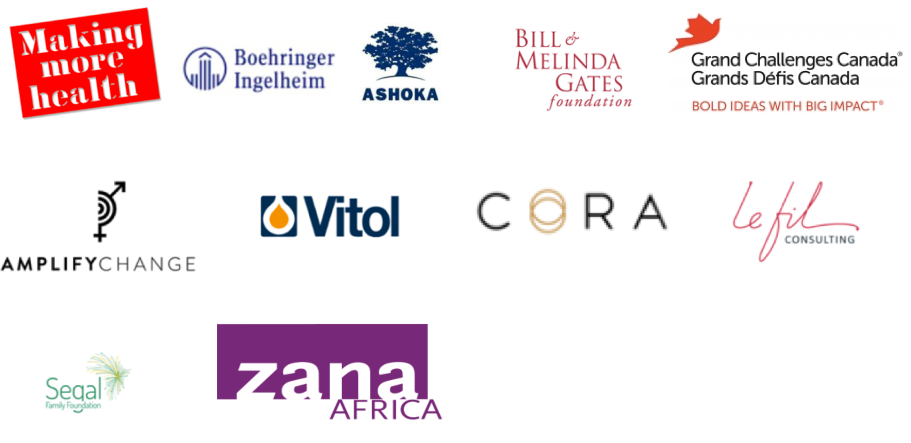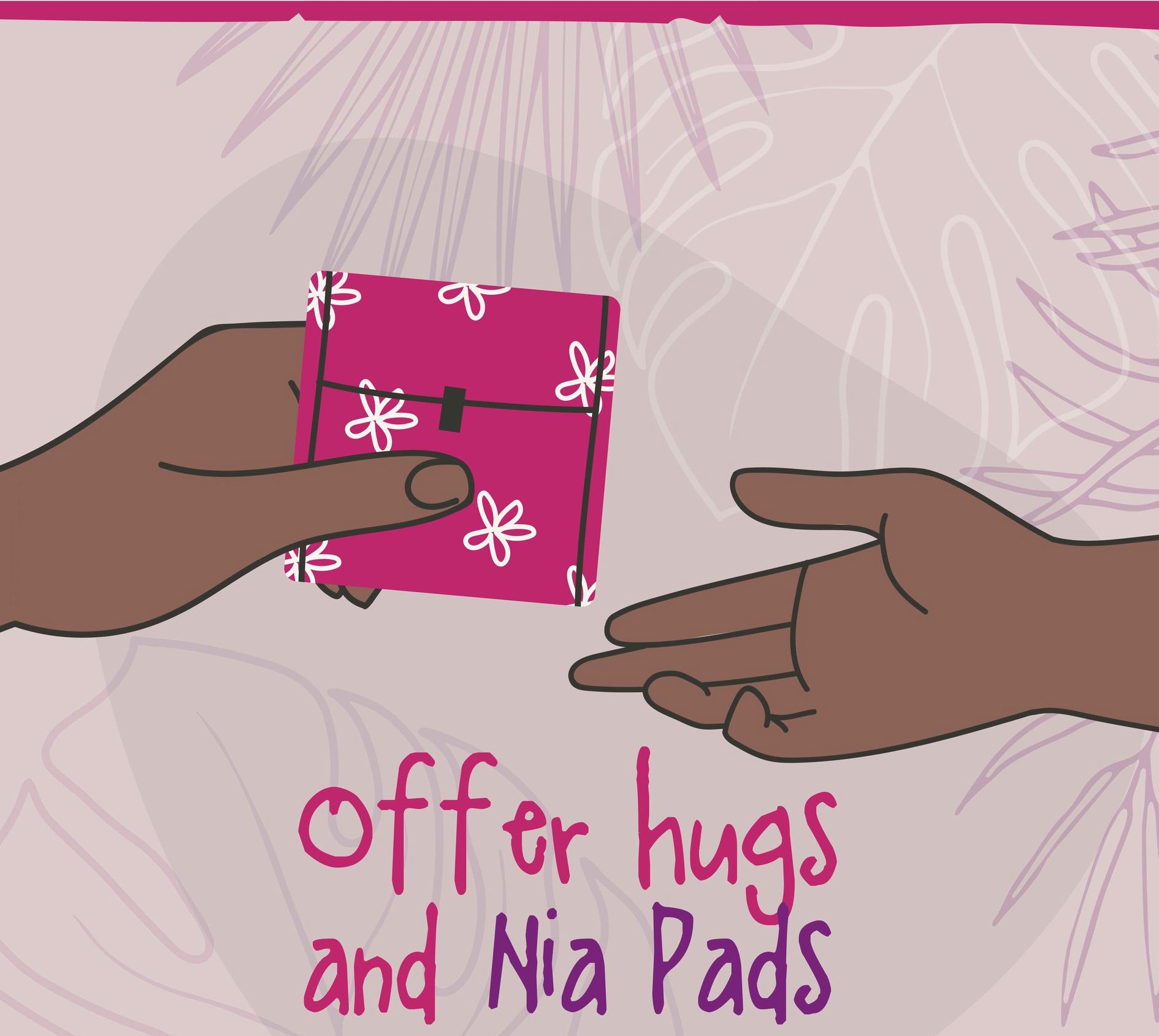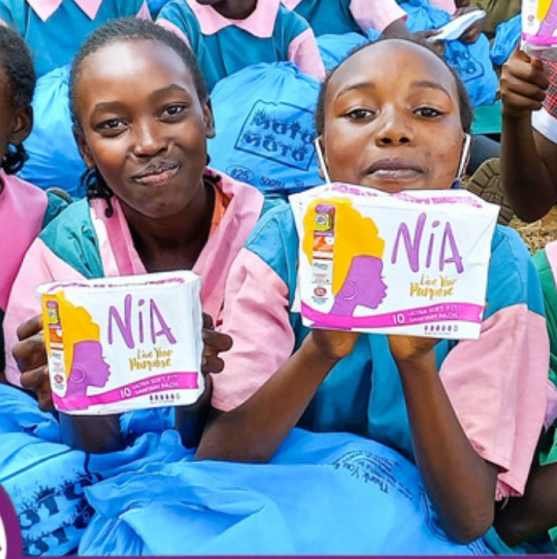Funding partners
We are grateful to have an incredible diversity of partners who say yes to gender equity, yes to positive and rights-based social norms, and yes to dignity in menstruation. They believe that business can create deep and growing social impact. They believe that best practices supported by data can be scaled through government. They believe that we must use all the resources available to make an enduring transformation.

Institutional partners
We continue to work with organizations that are thought leaders and sectoral experts driven by a commitment to see teenagers actualize their full rights to health and safety. We also work with a range of partners that deliver services and support to adolescents across Kenya. These include:

Community Based Organisations partners

Government partners
Founder and CEO, Megan White Mukuria, launched the National Sanitary Towels Campaign in 2006 as the then-Incoming present of the Rotary Club of Nairobi South. In partnership with the first-ever Gender Officer in the Ministry of Education, Girl Child Network, and other NGOs, this was the first known effort to put menstruation on the map with government globally, and built on the important 2004 work of female Ministers of Parliament to waive VAT for pads – a global first. Megan helped to subsequently found the National Sanitary Towels Coordinating Committee in 2008, which was instrumental in supporting girl-centered policy, and was retired when pads were written into government budgets.
Kenya continued to lead the way in crafting the first National Menstrual Hygiene Policy and Strategy, begun in 2015 and completed and launched in 2020. ZanaAfrica was on the technical working group for this initiative and was acknowledged for its contributions. Our work was also profiled as a best practice in Promises to Keep, a July 2021 report on the impact of COVID on adolescents commissioned by the Executive Office of the President of Kenya which highlighted the need for our intersectional programs.
The Nia Program was developed in close collaboration with the Kenya Ministry of Education, Science, and Technology (MoEST), the Kenya Ministry of Health (MOH), and the Kilifi County government. ZanaAfrica trained 40 Teachers Service Commission (TSC) teachers and 3 curriculum support officers in Western Kenya on this program in 2019 through our partnership with World Vision. This helped us to discover a key unmet need for teachers: processing their own past and present trauma so they can step up to be the support for teens that they want to be. We appreciate the ongoing contributions of the Beacon Teachers Movement to our work; this nationwide network of 5,000+ teachers is formally trained in child protection and a strong advocate of rights-based education in schools. In November 2022, ZanaAfrica signed a Memorandum of Understanding with the Kenya Institute of Curriculum Development to expand the Nia Program to reach teachers across Kenya.
Fellowships and Awards
We have been around for a while but our ideas are ever evolving. It’s important to get the right support at the right time to achieve the target impact we seek to make in the world. Our partners our many, but our ambitions for impact are even greater – we would like to reach 100 million in the next 10 years, so in many ways, we are just getting started.
We are grateful for these partners and how they’ve helped us crystalize our thinking, amplify our impact, or spread our message about the importance of menstrual management in gender justice, sexual and reproductive health and rights, or workplace productivity, and more.
 |
2022-2023 | Ideation on the Nia HealthLink; Global Advisory and Coaching support; expanding our network in the global reproductive justice world, and helping to spread the role of menstrual health education in achieving reproductive health outcomes |
 |
2021-2023 | Piloting of the Nia HealthLink in 3 counties testing it with 2 campaigns; relaunching sales post-COVID and helping us develop a clear value proposition. |
 |
2021-2022 | Business strategy support to reactivate sales post-COVID and introductions to new networks for investment into our business. |
 |
2019 | East Africa’s premiere leadership training program, it supported our Founder in design thinking and strategy at a crucial time post-RCT and while scaling our sales and expanded our network across East Africa |
 |
2018 | The Ashoka Globalizer program helped us to crystalize our idea of a “Fast Moving Educational Good” and to test out and launch our idea of partnership resources on our pad packs – ensuring we provided a critical lifeline during COVID, with 10% customer engagement |
 |
2017-2018 | Transformational Business Network helped us create a new business plan to focus on commercial markets with our newly proven revamped Nia brand, reaching 3500 kiosks through direct sales and improving drop size from $2.05 to over $4 per kiosk. |
 |
2017-2018 | The Girl Effect Accelerator, a venture between The Girl Effect and the Unreasonable Institute, gave us an expanded platform to share about the role of menstrual health in “development” |
 |
2014-2016 | As we were developing our intellectual property for making pads from locally available materials, and as we were conceptualizing our health education, these related programs helped us think through our strategy and played a role in ecosystem building. They continue to be a thought partner. |
 |
2014 | Our founder Megan Mukuria became an Ashoka Fellow in December 2014. Ashoka has played a vital role in shaping our thought leadership and helping us in turn elevate and support other social entrepreneurs |
 |
2013 | We were selected as one of six organizations in Africa doing pioneering work in health, and spent a week together in Capetown sharing experiences and learning from one another while supporting the innovative health ecosystem locally. |
 |
2013 | GrowthAfrica’s GrowthHub gave us our first office in Nairobi and put us through our first business training program as we launched our first versions of pad sales in 2014 through a women-to-women sales model |
 |
2011 | PopTech gave us our first global platform to share about our work, and amazing storytelling and public speaking training from Duarte. They brought us back in 2016 to learn more about our journey of impact and ecosystem building |
 |
2010 | MassChallenge was our first start-up accelerator at a time we were starting our journey in intellectual property and business development in Boston, MA, and gave us access to thought leaders and advisors to shape our strategy. |
 |
2010 | ZanaAfrica won the Wharton Africa Business Forum Business Plan Competition in 2009 for its plan to manufacture pads, which was heralded by the judges as "game-changing for Africa". This gave us our first seed funding of $7500. |



